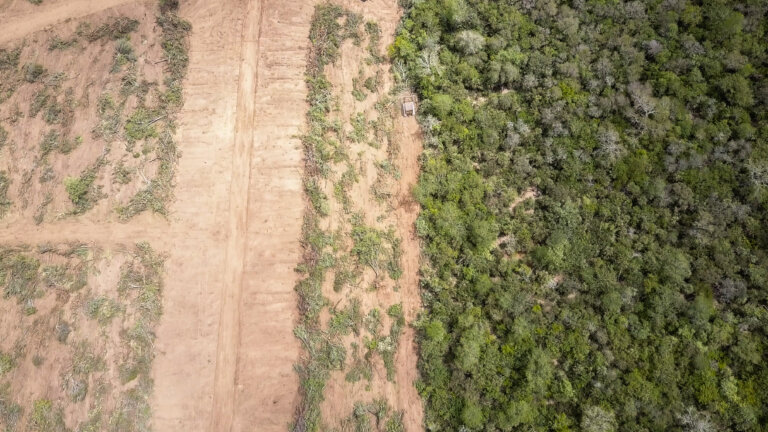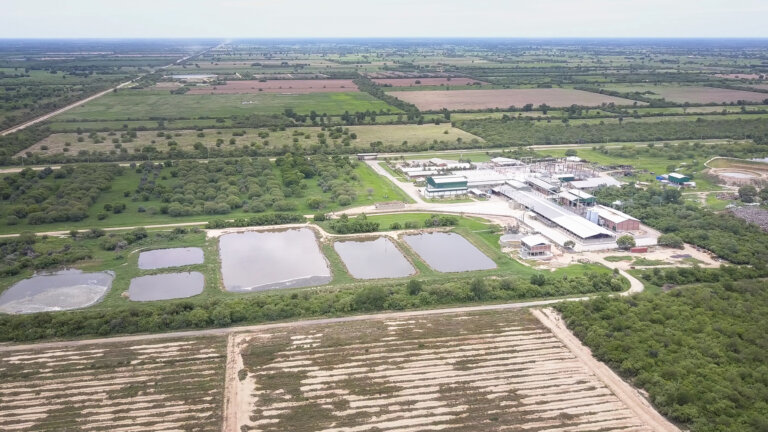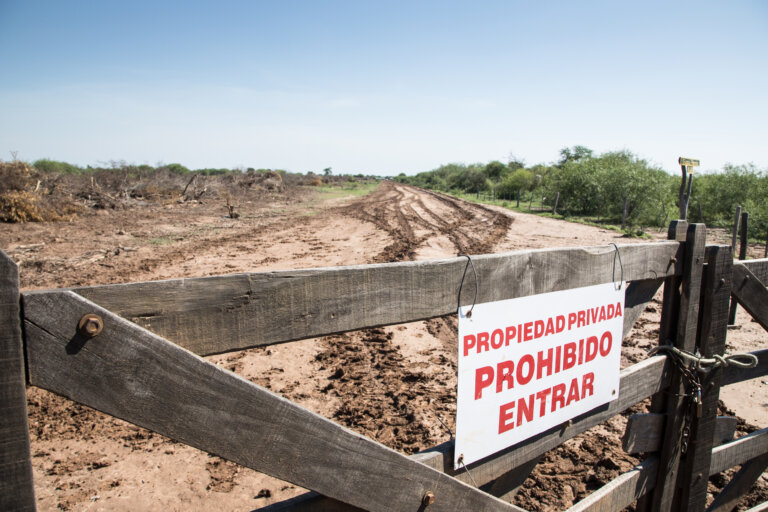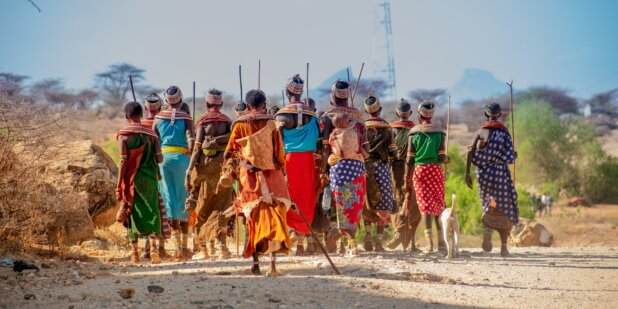- About
- Topics
- Picks
- Audio
- Story
- In-Depth
- Opinion
- News
- Donate
-
Signup for our newsletterOur Editors' Best Picks.Send
Read, Debate: Engage.
Pristine forests are not only on fire in the Amazon region. In the Chaco, the second largest primeval forest in South America, huge areas are being cleared for cattle farming. The trail of illegal deforestation leads from corrupt politicians in Paraguay to nefarious Brazilian beef producers and Italian leather importers to manufacturers of luxury cars in Europe and worldwide.
About six months ago, in September 2020, Earthsight, a British environmental NGO, published a report linking illegal deforestation of pristine forests inhabited by one of the world’s last uncontacted tribes with some of Europe’s biggest car manufacturers.
The clearances occurred in Paraguay‘s Gran Chaco, a precious bioregion - home to jaguars and giant anteaters whose forests are being destroyed faster than any others on earth. This destruction is being driven by cattle ranching firms eager to meet international demand for beef and leather. The illegal clearance of land officially left for indigenuous communities that wanted to live in isolation is the most egregious example of widespread environmental abuses in Paraguay.
The majority of the country’s beef and leather exports come from recently deforested land, up to a fifth of which was cleared illegally.
Earthsight‘s investigations led to a report titled Grand Theft Chaco, which impressively reveals the weaknesses of globalised supply chains - from cattle farmers to slaughter houses in Paraguay to tanneries in Italy to numerous famous car manufacturers like BMW, Jaguar, Range Rover etc.
FairPlanet spoke to Sam Lawson, founding director of Earthsight, about their investigations.
FairPlanet: When did you start investigating the illegal deforestation in connection to the leather industry in Paraguay?
Sam Lawson: First, we actually investigated illegal logging for charcoal from Paraguay, which is then sold in European supermarkets; that was in 2017. We started looking at the clearing of the Chaco for the leather industry in the beginning of 2019. It was an 18-month long investigation.
What exactly did your investigation entail?
There were a number of different sources. We used satellite imagery that was largely publicly available if you know where to look for it and how to analyse it. The other large part of the investigation was data analysis of databases with records of numerous individuals from different countries and different backgrounds, and that was quite a data crunching exercise.
You know, the challenge with this kind of investigation is to tell who‘s responsible for the destruction that you see. Deforestation is fairly easy to see on satellite photos, but then you need to figure out whether or not it‘s legal, and who‘s responsible, and that cannot be done just by looking at photos. You need to check government documents to see which part of the land was given to whom and for what purpose. And that involves a lot more on-the-ground work, talking to people etc.
Particularly challenging in this investigation was to make supply chain connections within Paraguay. You trace the cows from the ranches to the slaughter houses, then to the tanneries, then tracing the leather from the first importers in Europe to the car companies.
In your report you say that the supply chain of leather is much less observed than, for example, palm oil or cocoa. Why is that?
It‘s partly because the focus is often on beef rather than leather. And that is because the industry likes to claim that leather is really only a by-product of the beef industry, and therefore they wouldn‘t have a direct responsibility for driving deforestation.
But as we explained in our report, that‘s really nonsensical. Though it is a minority of the total value of a cow, the leather has a value, and often that extra value is what tips greenfield cattle ranching over the line into profitability. If selling the leather didn't bring in profits, they wouldn't do it. But still, there is much more attention to beef and leather gets forgotten about as a driver.
In Paraguay, the cattle industry is almost entirely driven by external forces.

Active deforestation in the Paraguayan section of the Chaco - South America's second largest primeval forest. © Earthsight
When you look at the situation in Paraguay, and then examine neighbouring countries like Brazil or Argentina, which are big beef producers as well, how do they compare?
Well, Brazil gets a lot more attention than Paraguay, because many donors and funders look at the tropical rainforest at the Amazon rather than to forests of the Chaco. Although the Chaco contains some impressive megafauna like jaguars of giant anteaters, it just looks different from a tropical rainforest, and also its indigenuous peoples get more attention in Brazil than in Paraguay.
Another difference in terms of economy is that cattle production in Brazil is mainly for domestic beef consumption, whereas in Paraguay the cattle industry is almost entirely driven by external forces; their beef is mainly for export purposes. In fact, as we showed in our report, beef production in Paraguay is the most deforestation-intensive commodity anywhere in international trade.

Aerial shot of the Chortitzer slaughterhouse in Paraguay. The firm supplies cow hides to tanneries who in turn supply Jaguar and Land Rover. © Earthsight
How do you compare the level of corruption at the political class in Paraguay to its neighbours?
I think it‘s similar. And it is similar up to the point that there are basically the same actors. A lot of the companies that are operating in Paraguay, individually rich agro-business people operating in Paraguay, are Brazilians. So, we have the same people that are responsible for corruption and land rights abuses and deforestation in Brazil also involved in Paraguay [...] The previous [Paraguayan] prime minister invited agribusinesses from Brazil to come and “use and abuse Paraguay.”
The political economy is very similar in the sense that agribusiness has a very big role in politics. In fact, I think their influence in Paraguay is even bigger than in Brazil, because Paraguay relies much more on it than Brazil.
How did you get to know about the indigenous Ayoreo people and their struggle for survival?
I first learned about their struggle when we were doing the charcoal investigations. They used to roam all around the Chaco for ages. After a protracted battle, in 2001 they finally obtained rights to 5,500 square kilometres of land from the government, the PNCAT, where they were told they could live in voluntary isolation, just as they wanted.
But that didn‘t stop the bulldozers. Since 2005, 53,000 hectares of Ayoreo forest have been cleared and converted to cattle pasture. In fact, the PNCAT area is the worst, because it was kind of a test case for the government. If they don‘t even stop the bulldozers here, they won‘t stop them anywhere.

Entrance gate to a cattle ranch in an area of the Paraguayan Chaco decimated by extensive deforestation. © Earthsight
During the investigation there were threats against other NGOs that you cooperated with. Have you been threatened as well?
Alberto Yanosky from [the] NGO Guyra has received threats, that‘s right. But we at Earthsight didn‘t get any, no.
In Germany, their draft for a Supply Chain Act has been weakened so badly, it‘s a shame.
Some of the major car manufacturers were involved by using leather in their cars from cattle which was grown in areas where pristine forests were illegally turned into pasture. Meanwhile in Europe, their lobbyists are trying to block or to wash the planned Supply Chain Act that is being discussed in the European Union. Who is trying to block it, and how?
Well, in Germany they seem to be successful. Their draft for a Supply Chain Act has been weakened so badly, it‘s a shame really. It‘s the same old story, they don‘t want to sacrifice their profits. They say they don‘t want to overburden their industry, but actually it‘s just about their profits. They wanted to exempt smaller companies from the law, but the result is now that only the really big corporations would be affected. They call it “groundbreaking” and “ambitious”, but it‘s actually pretty ridiculous. It‘s so ridiculous that even other European governments didn‘t want to copy it.
What happened after you published your report last year?
[...] The European Parliament cited our report and called the EU to pass a legislation to tackle the problem. That was a success. BMW and some other car manufacturers announced that they want to improve their monitoring of their supply chains. But ultimately, it is up to governments, legislators, to solve the problem.
Sam Lawson is the founding director of Earthsight. For about 20 years, Lawson has worked for various organisations that deal with, among other issues, illegal deforestation.
Image by Earthsight.
